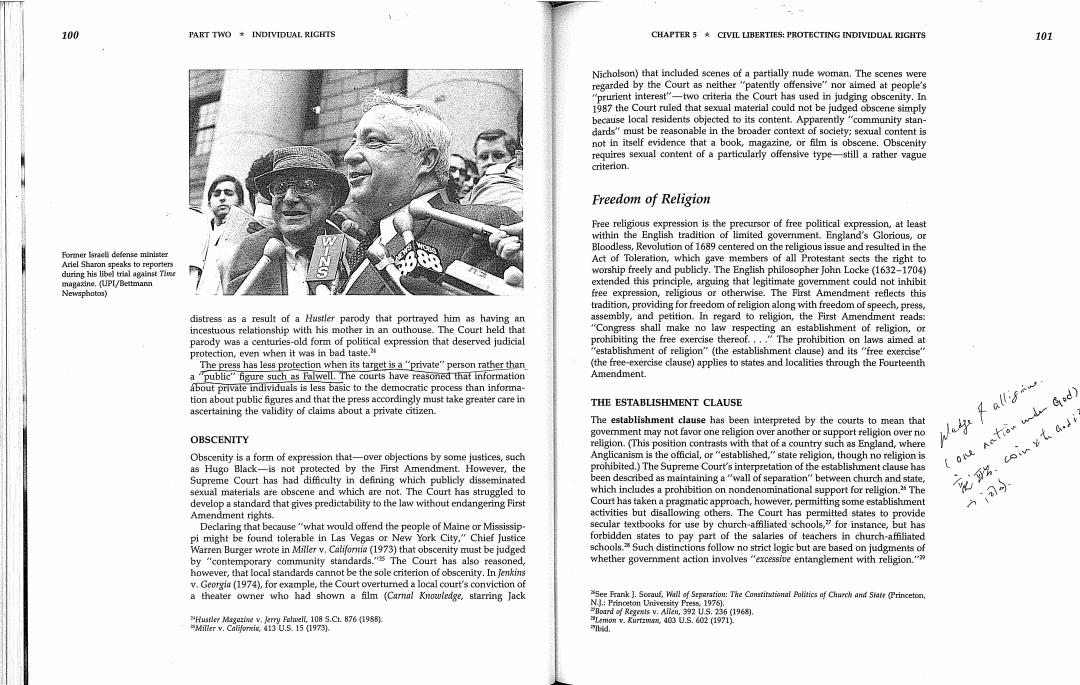正在加载图片...

100 PART TWO INDIVIDUAL RIGHTS CHAPTER 5*CIVIL LIBERTIES:PROTECTING INDIVIDUAL RIGHTS 101 Nicholson)that included scenes of a partially nude woman.The scenes were regarded by the Court as neither"patently offensivenor aimed at people's 'prurient interest"-two criteria the Court has used in judging obscenity.In 1987 the Court ruled that sexual material could not be judged obscene simply because local residents objected to its content.Apparently"community stan dards"must be reasonable in the broader context of society;sexual content is not in itself evidence that a book,magazine,or film is obscene.Obscenity requires sexual content of a particularly offensive type-still a rather vague criterion. Freedom of Religion Free religious expression is the precursor of free political expression,at least within the English tradition of limited government.England's Glorious,or Bloodless,Revolution of 1689 centered on the religious issue and resulted in the Formner defense minister L speaks to Act of Toleration,which gave members of all Protestant sects the right to during his lib worship freely and publicly.The English philosopher John Locke (1632-1704) magazine.(UPI/Bettmann extended this principle,arguing that legitimate government could not inhibit Newsphoto) free expression,religious or otherwise.The First Amendment reflects this tradition,providing for freedom of religion along with freedom of speech,press, distress as a result of a Hustler parody that portrayed him as having an assembly,and petition.In regard to religion,the First Amendment reads: incestuous relationship with his mother in an outhouse.The Court held that "Congress shall make no law respecting an establishment of religion,or parody was a centuries-old form of political expression that deserved judicial prohibiting the free exercise thereof.The prohibition on laws aimed at protection,even when it was in bad taste.2 'establishment of religion"(the establishment clause)and its "free exercise" The press has less protection when its target is a"private"person rather than (the free-exercise clause)applies to states and localities through the Fourteenth "public"figure such as Falwell.The courts have reasoned thaf information Amendment. About private individuals is less basic to the democratic process than informa- tion about public figures and that the press accordingly must take greater care in THE ESTABLISHMENT CLAUSE ascertaining the validity of claims about a private citizen. alf心 The establishment clause has been interpreted by the courts to mean that government may not favor one religion over another or support religion over no OBSCENITY rellgion.(This position contrasts with that of a country such as England,where Obscenity is a form of expression that-over objections by some justices,such Anglicanism is the official,or "established,"state religion,though no religion is as Hugo Black-is not protected by the First Amendment.However,the prohibited.)The Supreme Court's interpretation of the establishment clause has Supreme Court has had difficulty in defining which publicly disseminated been described as maintaining a "wall of separation"between church and state, sexual materials are obscene and which are not.The Court has struggled to which includes a prohibition on nondenominational support for religionThe 配%、 develop a standard that gives predictability to the law without endangering First Court has taken a pragmatic approach,however,permitting some establishment 内 Amendment rights. activities but disallowing others.The Court has permitted states to provide Declaring that because"what would offend the people of Maine or Mississip- secular textbooks for use by church-affiliated schools,for instance,but has pi might be found tolerable in Las Vegas or New York City,"Chief Justice forbidden states to pay part of the salaries of teachers in church-affiliated Warren Burger wrote in Miller v.Calforia (1973)that obscenity must be judged schools.Such distinctions follow no strict logic but are based on judgments of by "contemporary community standards."The Court has also reasoned, whether government action involves"xe entanglement with religion. however,that local standards cannot be the sole criterion of obscenity.In jexkins v.Georgin(1974),for example,the Court overturned a local court's conviction of a theater owner who had shown a film (Carnal Knowledge,starring Jack auf,Wall of Separatiou:The Canstirstional Politics af Church and State (Princeton Felmell,108 S.Ct.876 (198B) 36196. 6021971i bid